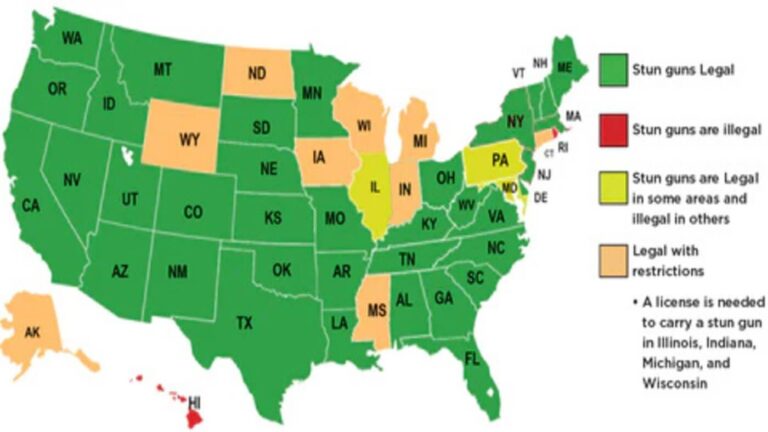Table of Contents
- Recent Changes in Massachusetts Stun Gun Regulations and Their Impact
- Understanding Legal Requirements for Possession and Use
- Navigating Permit Application Processes with Confidence
- Practical Tips for Staying Compliant and Avoiding Legal Issues
- To Wrap It Up
Recent Changes in Massachusetts Stun Gun Regulations and Their Impact
Massachusetts has recently enacted significant changes to its stun gun regulations, reshaping how residents and visitors approach personal safety devices. Previously, the state had stringent rules that made possession and carrying of stun guns subject to heavy restrictions, often requiring a firearm license. The new provisions have relaxed these constraints, allowing easier access while still maintaining public safety standards. However, these changes come with updated guidelines regarding the purchase, possession, and use of stun guns, which users must understand to stay compliant. Key points include:
- Expanded eligibility for purchasing stun guns without a firearms license.
- Mandatory safety training for first-time buyers, ensuring responsible ownership.
- Stricter penalties for misuse or unlawful deployment of the device.
These legislative shifts have created both opportunities and challenges for Massachusetts residents. On one hand, individuals looking to enhance their personal security now find it easier to obtain a stun gun legally, promoting a sense of preparedness without excessive bureaucracy. On the other hand, the emphasis on education and adherence to ethical use underscores a balanced approach to public safety. Businesses and retailers also face new compliance requirements, including verification processes and record-keeping, which aim to prevent unauthorized distribution. Overall, understanding the nuances of these updates is essential for anyone considering stun gun ownership in Massachusetts, as failure to comply could result in severe legal consequences.
Understanding Legal Requirements for Possession and Use
Possession and use of stun guns in Massachusetts have recently undergone notable changes that every resident should be aware of. While these devices are often classified under self-defense tools, the law imposes specific conditions to ensure they are used responsibly and legally. It is crucial to understand that owning a stun gun isn’t an unrestricted right; rather, it involves compliance with state statutes that regulate who may carry them, where, and under what circumstances. Penalties for violations can be severe, including fines and possible criminal charges, emphasizing the importance of staying informed about these legal boundaries. For example, stun guns remain prohibited in certain sensitive locations like schools or government buildings regardless of individual possession rights.
Key legal considerations include:
- Eligibility criteria such as age restrictions and criminal background checks
- Requirements for permits or licenses to carry stun guns in public
- Restrictions on transportation and storage to minimize misuse
- Clear definitions of proper self-defense use to avoid legal repercussions
By adhering to these regulations, residents can responsibly benefit from stun guns as a non-lethal means of protection without falling afoul of Massachusetts law. Staying updated with ongoing legal refinements ensures that individuals use these tools within the limits set by state authorities.
Navigating Permit Application Processes with Confidence
Securing a stun gun permit in Massachusetts involves navigating a system designed to ensure public safety while respecting individual rights. Understanding the application requirements firsthand can drastically reduce delays and frustrations. Start by compiling essential documents such as proof of residency, valid identification, and, if applicable, evidence of firearm training certification. Familiarity with local law enforcement office hours and their preferred submission methods-whether in-person or online-can streamline your experience significantly.
Tips for a smoother permit application process:
- Double-check all forms for completeness before submission.
- Maintain copies of each document submitted for your records.
- Prepare for a potential background check by understanding what information is needed and where it will be sourced.
- Allocate adequate time for the processing period, which can vary by jurisdiction.
Practical Tips for Staying Compliant and Avoiding Legal Issues
To ensure you remain on the right side of Massachusetts stun gun regulations, always verify that your device complies with the state’s legal requirements before purchasing or carrying it. Keep documentation of your purchase and any permits readily accessible, as law enforcement may request proof of legality during an inspection. Additionally, make it a point to stay informed about any changes in local legislation, since laws can evolve quickly, and staying updated could save you from inadvertent violations.
Implement these quick strategies to avoid legal pitfalls:
- Regularly review state and municipal websites for updated stun gun laws.
- Avoid using stun guns in prohibited areas, such as schools or government buildings.
- Store your device securely and out of reach of unauthorized users, especially minors.
- Never brandish or use stun guns recklessly, as misuse can lead to criminal charges.
To Wrap It Up
As Massachusetts continues to update its stun gun laws, staying informed is crucial for both residents and visitors alike. Understanding the latest regulations not only helps you stay compliant but also ensures your safety and peace of mind. Whether you’re considering a stun gun for personal protection or simply want to stay ahead of legal changes, keep this guide handy and consult official resources regularly. Staying educated and prepared is the best way to navigate the evolving landscape of self-defense laws in the Bay State.Check Our Other Blogs
- StunGun – Your Trusted Source for Stun Guns, Laws, and Self-Defense Tips
- PepperSprayLaws – Your Trusted Resource for Pepper Spray Information
- StunGunLaws – Your Trusted Guide to Stun Gun Legality and Safety





